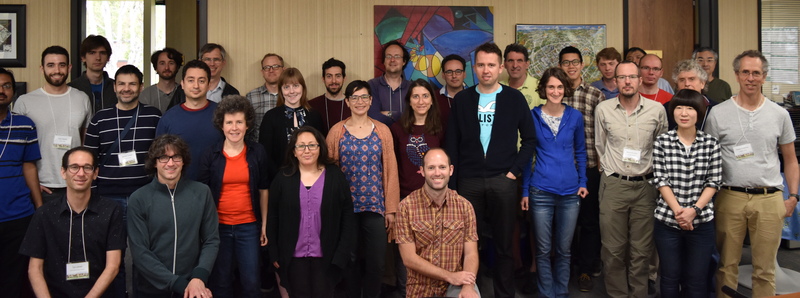Symplectic four-manifolds through branched coverings
May 14 to May 18, 2018
at the
American Institute of Mathematics,
San Jose, California
organized by
Tye Lidman,
Daniel Ruberman,
and Laura Starkston
Original Announcement
This workshop will be devoted to
studying problems in the topology of symplectic four-manifolds by
using connections with
gauge theory, holomorphic curves, and algebraic geometry. It is known that every
symplectic four-manifold arises from a branched cover over a symplectic surface
in $\mathbb{C}P^2$, and thus both branched covering constructions and symplectic
curves in $\mathbb{C}P^2$ provide hands-on techniques to understand many
important problems in symplectic 4-manifold topology. A significant aim of the
workshop is to import and extend techniques from the algebro-geometric study of
complex curves in complex surfaces and their birational classifications into the
category of symplectic four-manifolds. A similar goal applies to the use of
gauge theory/Floer homology invariants for similar problems, as recently these
invariants have made new progress towards understanding curves in
$\mathbb{C}P^2$ and the algebraic topology of symplectic 4-manifolds. The focus
will be on concretely building connections between these areas and symplectic
topology while working directly on specific problems in symplectic topology
posed throughout the workshop.
The main topics for the workshop are:
- Understanding symplectic surfaces in $\mathbb{C}P^2$, especially which types
of singularities can occur and the number of isotopy classes of singular
symplectic surfaces
-
Understanding the extent to which the Bogomolov-Miyaoka-Yau inequality from
complex algebraic geometry extends to symplectic four-manifolds
-
Determining when a smooth four-manifold admits a branched cover which is
symplectic and in connection, exploring how gauge theoretic invariants of
four-manifolds behave under branched coverings
Material from the workshop
A list of participants.
The workshop schedule.
A report on the workshop activities.
A list of open problems.
Papers arising from the workshop:

